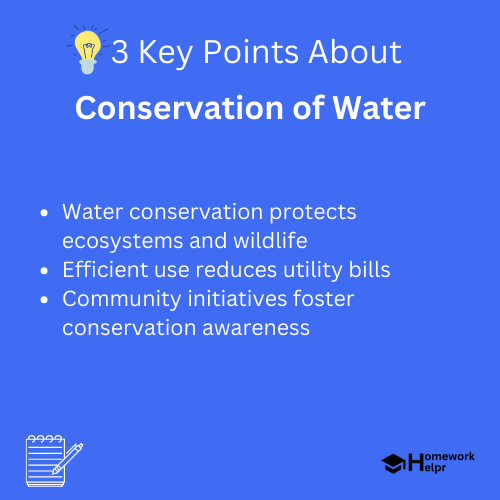📝 Summary
Water conservation is essential for sustaining life and protecting the environment. As the demand for water grows due to industrialization and population increases, effective conservation strategies are crucial. Water conservation involves using water judiciously, adopting practices that benefit both individuals and ecosystems. Strategies include fixing leaks, using water-saving fixtures, and implementing community initiatives. With technological advancements like smart meters and drip irrigation, we can enhance water conservation efficiency. Ultimately, it helps address water scarcity, lowers costs, and promotes a sustainable future for all.
Conservation of Water
Water is one of the most vital resources on our planet. It sustains life, supports ecosystems, and is essential for human survival. However, due to increasing population and industrialization, the demand for water has skyrocketed. Consequently, the need for effective conservation strategies has become imperative. In this article, we will explore various methods and benefits of water conservation, as well as interesting facts about this critical issue.
Understanding Water Conservation
Water conservation refers to the practice of using water wisely and judiciously to reduce unnecessary water usage. The goal is not only to save water but also to preserve the environment and ensure that future generations have access to clean and safe water. It involves a range of practices, from simple household measures to large-scale community initiatives.
Definition
Industrialization: The process by which an economy is transformed from primarily agricultural to one based on the manufacturing of goods. Judiciously: With good judgment or sense; wisely. Initiatives: Plans or strategies intended to resolve a problem or improve a situation.
Importance of Water Conservation
Water is limited, and its availability varies significantly across different regions. The importance of conserving water lies in several key areas:
- Environment Protection: Reducing water waste helps to protect aquatic ecosystems and wildlife habitats.
- Economic Efficiency: Saving water can lead to lower utility bills and reduced costs for treating and distributing water.
- Addressing Scarcity: Many regions face water scarcity, where the demand for water exceeds the available supply. Conservation can help alleviate this issue.
- Climate Change Resilience: Water-saving measures can make communities more resilient to the impacts of climate change, such as droughts and flooding.
Examples
For instance, a household that repairs leaks and installs water-saving fixtures can significantly reduce its water consumption.
Practical Ways to Conserve Water at Home
There are numerous practical methods that individuals can adopt to conserve water effectively at home. Here are some simple strategies:
- Fix Leaks: Leaky faucets and toilets can waste a tremendous amount of water. Regular maintenance can help solve this.
- Use Water-Saving Fixtures: Installing low-flow showerheads, faucets, and toilets can greatly reduce water usage.
- Take Shorter Showers: Aim for shower durations of 5 to 10 minutes to save water.
- Run Full Loads: Only operate dishwashers and washing machines when they are full to maximize water efficiency.
Additionally, you can invest in a rain barrel to collect runoff water from your roof for future use in watering your garden or plants. This helps to recycle water and reduces your overall consumption.

Water Conservation in Agriculture
Agriculture is one of the largest consumers of freshwater globally. Implementing water conservation techniques in farming can lead to sustainable practices that conserve precious water resources. Some methods include:
- Drip Irrigation: This system delivers water directly to plant roots, minimizing evaporation and runoff.
- Mulching: Covering the soil with materials like straw reduces evaporation and keeps the soil moist.
- Crop Rotation: Alternating crops in a field can enhance soil moisture retention and reduce water needs over time.
Examples
For example, a farmer employing drip irrigation can save up to 70% more water compared to traditional irrigation methods.
The Role of Technology in Water Conservation
Modern technology plays an essential role in water conservation. Innovative solutions and technologies are emerging to help individuals and organizations use water resources more efficiently. Some noteworthy advancements include:
- Smart Meters: These devices provide real-time data about water usage, allowing homeowners to monitor and manage their consumption.
- Weather Forecasting Tools: By predicting rainfall, these tools help farmers plan their irrigation schedules more effectively.
- Advanced Recycling Methods: Technology enables the treatment and recycling of wastewater for reuse in irrigation and industrial processes.
Community Initiatives and Policies
Beyond individual efforts, community initiatives and policies play a critical role in fostering a culture of water conservation. Some examples include:
- Public Awareness Campaigns: Educating communities about the importance of water conservation through workshops and promotional materials.
- Water Usage Policies: Implementing regulations that promote sustainable water usage in agriculture and industry.
- Incentive Programs: Offering discounts or rebates for households that adopt water-saving fixtures or systems.
❓Did You Know?
Did you know that about 97% of the Earth’s water is saline, found in oceans, while only 3% is freshwater? Of that, two-thirds is locked in glaciers and ice caps!
Conclusion
Water conservation is not just a responsibility; it is a necessity for sustaining our planet’s most precious resource. By adopting practical measures at home, supporting technological advancements, and engaging in community initiatives, we can collectively make a difference. Remember, every drop counts! Start your journey toward water conservation today, and contribute to a sustainable future for generations to come.
Related Questions on Conservation of Water
What is water conservation?
Answer: It is the practice of using water wisely to reduce waste.
Why is water conservation important?
Answer: It helps protect ecosystems and addresses water scarcity.
How can individuals conserve water at home?
Answer: Fix leaks, use water-saving fixtures, and take shorter showers.
What role does technology play in water conservation?
Answer: Technology provides tools like smart meters for better water management.
